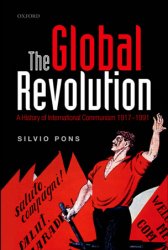
Автор: Silvio Pons
Название: The Global Revolution: A History of International Communism 1917-1991
Издательство: Oxford University Press
Год: 2014
ISBN: 9780199657629
Серия: Oxford Studies in Medieval European History
Язык: English
Формат: pdf
Размер: 5,5 mb
Страниц: 400
Drawing on a wealth of archival sources, Silvio Pons analyses the multifaceted and contradictory relationship between the Soviet Union and the international communist movement, to show how communism played a major part in the formation of our modern world.
The volume presents the argument that during the age of wars from 1914 to 1945, the establishment of the Soviet state in Russia and the birth of the communist movement had an enormous impact because of their promise of world revolution and international civil war. Such perspective appeared even more plausible in the aftermath of the Second World War and of revolution in China, which paved the way for the expansion of communism in the post-colonial world. Communism challenged the West in the Cold War - by means of anti-capitalist modernization and anti-imperialist mobilization - showing itself to be a powerful factor in the politicization of global trends. However, the international legitimacy of communism declined rapidly in the post-war era. Soviet power exposed its inability to exercise hegemony, as distinct from domination.
The consequences of Sovietization in Europe and the break between the Soviet Union and China were the primary reasons for the decline of communist influence and appeal. Since communism lost its political credibility and cultural cohesion, its global project had failed. The ground was prepared for the devastating impact of Western globalization on communist regimes in Europe and the Soviet Union.
Abbreviations ix
Introduction xi
Prologue: War and Revolution 1
1. Time of Revolution (1917–1923) 7
Lenin, the Soviet State, and the Comintern 7
Victory in Russia, Defeat in Europe 16
The Birth of the Communist Parties 24
The End of European Revolution 35
2. Time of the State (1924–1939) 43
World Revolution and ‘Socialism in One Country’ 43
Between East and West 54
Stalin, the ‘Revolution from above’, and the Psychosis of War 65
Communists and Anti-fascism 75
The Total-Security State 86
The Molotov–Ribbentrop Pact 91
3. Time of War (1939–1945) 102
The Alliance with Hitler 102
The Patriotic War and the End of the Comintern 111
Spheres of Influence, National Fronts, and ‘People’s Democracy’ 124
Victory without Revolution 137
4. Time of Empire (1945–1953) 144
The Birth of the ‘External Empire’ 144
The Founding of the Cominform 155
The Break between the USSR and Yugoslavia 167
Revolution in China and War in Korea 175
The ‘Revolution from above’ in Eastern and Central Europe and the
Pacifist Mobilization 184
Communists and the Cold War 193
5. Time of Decline (1953–1968) 206
The Crisis in Central and Eastern Europe 206
The End of Communist Unity 218
Expansion in the Third World and the Rift between the Soviet Union
and China 231
The Limits upon Soviet Influence 244
viii Contents
6. Time of Crisis (1968–1991) 255
1968 and the Prague Spring 255
The Break-Up of the Movement 265
The Global Superpower 273
Eurocommunism 284
The Crisis of Legitimacy 293
Reform and Collapse 305
Epilogue: The End of Soviet and European Communism in World History 315
References 323
Index 353
|